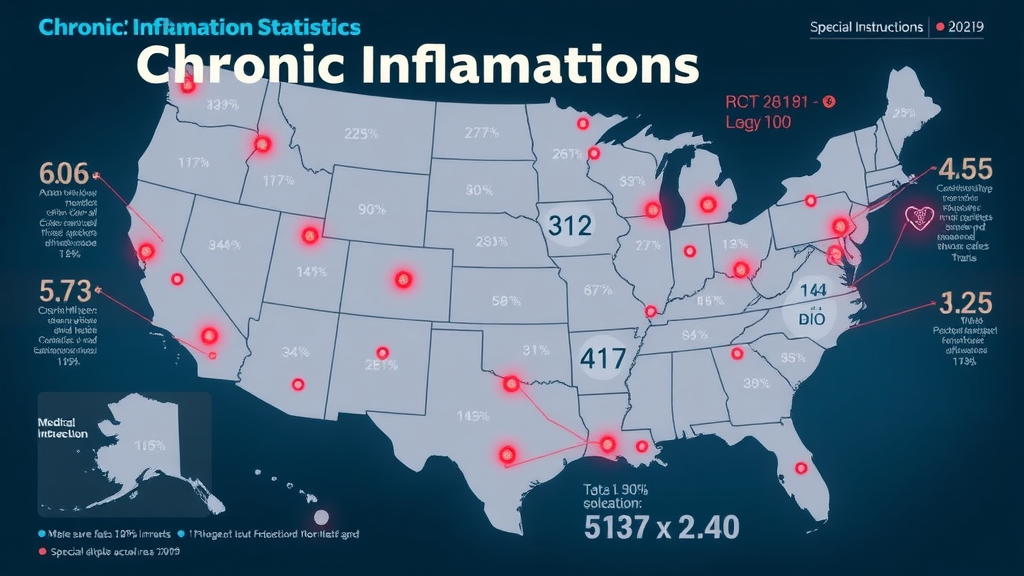Could eliminating plant foods and focusing on nutrient-rich animal products be the key to healing inflammation—an epidemic quietly affecting millions today? Groundbreaking research is turning the nutrition world upside down, revealing that the carnivore diet stops inflammation where countless other approaches fail.
Opening up the Truth: A Startling Statistic on Inflammation
"More than 50 million Americans suffer from chronic inflammation, leading researchers to call it the 'silent epidemic' of modern life."

Chronic inflammation is not just a medical buzzword; it’s an urgent, often invisible threat that impacts millions across the United States. With over 50 million Americans affected, chronic inflammation now underlies a sweeping range of ailments—from autoimmune conditions to metabolic syndrome and heart disease. The modern diet, brimming with processed foods and hidden irritants, is increasingly under scrutiny as a root cause. While many are turning to plant-based and keto diets, an emerging camp of experts claims that only the carnivore diet stops inflammation effectively for a growing subset of sufferers. But what makes this approach so different, and are the bold claims justified by the evidence?
What You'll Learn About How the Carnivore Diet Stops Inflammation
- How the carnivore diet stops inflammation at the root
- Why red meat and animal products may be key to reducing chronic inflammation
- Expert insights into the connection between gut health and inflammation
- The role of processed foods in fuelling inflammation
- New findings on the ketogenic diet, autoimmune conditions, and weight loss
Understanding the Carnivore Diet: Not Just Another Fad
What is the Carnivore Diet and How Might it Stop Inflammation?
The carnivore diet is a radical departure from mainstream nutritional guidance. It’s not simply another low-carb or keto variation, but an animal product-based diet that eliminates all plant foods, focusing on red meat, organ meats, seafood, eggs, and sometimes dairy. Proponents argue that this strict elimination diet targets chronic inflammation at its source—by purging dietary triggers like lectins, phytates, oxalates, and processed foods commonly found in even “healthy” plant-based diets. Unlike moderation strategies, the carnivore diet stops inflammation by fundamentally reimagining what food can and cannot safely do to our bodies. This has raised eyebrows among conventional dietitians, but for many struggling with relentless symptoms, it’s a compelling experiment backed by both clinical testimonies and emerging science on gut health and the immune system.
Advocates suggest that removing virtually all plant foods may relieve gut irritation and immune system activation—common drivers for individuals with autoimmune conditions and persistent metabolic issues. The simplicity and focus on nutrient-dense animal foods contrasts sharply with the complexity of most anti-inflammatory diets, which often involve counting macros or eliminating only subsets of foods. By resetting the diet to ancestrally consistent fare, adherents claim the carnivore diet offers sustained remission from inflammation and related symptoms.

Carnivore Diet vs. Ketogenic Diet: Is Cutting Plant Foods the Game-Changer?
The ketogenic diet, widely popular for weight loss and managing blood sugar, limits carbohydrate intake but still permits a broad swath of plant foods, nuts, and low-starch vegetables. In contrast, the carnivore diet eliminates even low-carb plant sources, making animal products the sole source of energy and nutrients. This sharp distinction may be the underlying reason the carnivore diet stops inflammation in cases where keto or other low-carb approaches fail. For individuals with sensitivity to plant compounds, the presence of even a minority of plant food can perpetuate gut irritation, microinflammation, and immune activation. A growing body of anecdotal and clinical case reports shows that full elimination unlocks a new level of symptom improvement—pointing to the possibility that it’s not carbs per se, but specific plant compounds disrupting gut health and perpetuating inflammation.
Additionally, the carnivore diet’s emphasis on fatty acids and nutrient-rich organ meats, absent in most plant-based foods, appears crucial. Some studies suggest that high intake of omega-3 fatty acids and saturated fats from pastured animal products supports immune modulation and lowers biomarkers of chronic inflammation more robustly than traditional keto or plant-based strategies. Understanding these nuances may help explain why the carnivore diet is gaining traction as a front-line intervention in the fight against chronic inflammation.
| Diet Feature | Carnivore Diet | Ketogenic Diet | Standard Diet |
|---|---|---|---|
| Plant foods | Eliminated | Limited | Emphasized |
| Animal products | Exclusive | Prominent | Moderate |
| Carbohydrates | Very low | Low | High |
The Role of Red Meat and Animal Products in Reducing Inflammation
Red Meat: Villain or Unsung Hero for Chronic Inflammation?
"Red meat, in the absence of processed foods, appears not to drive inflammation but rather may reduce it in some individuals." — Dr. Michael Eades

For decades, red meat has been painted as the villain behind heart disease, cancer, and chronic inflammation, primarily due to its saturated fat content and association with high-calorie Western diets. However, emerging research challenges these notions by isolating the effects of unprocessed animal products from those of processed foods and sugars. Studies show that when individuals consume a carnivore diet rich in red meat and organ meat—but free of processed foods and grains—common inflammatory markers like CRP (C-reactive protein) and IL-6 often decrease rather than increase. The demonization of red meat seems increasingly unwarranted, especially when it’s part of a well-executed, whole-foods-based diet designed to heal the gut and modulate the immune response.
Moreover, the positive link between high-quality, grass-fed red meat and improved metabolic profiles is gaining recognition among researchers. Contrary to previous fears, the elimination of sugar, processed meats, and plant-based oils appears to allow the health benefits of animal products to shine through. By focusing exclusively on nutrient-dense, unprocessed sources, the carnivore diet stops inflammation, overturning long-held nutrition dogma. Is it time to reconsider what constitutes a truly inflammatory food?
Essential Fatty Acids & Organ Meats: The Missing Nutritional Link
- Omega-3 and Omega-6 fatty acids
- Benefits of nutrient-dense organ meats
- Saturated fat and immune system modulation

A key benefit of the carnivore diet is its emphasis on critical nutrients absent or only sparingly found in plant foods. Omega-3 and omega-6 fatty acids—long recognized for their roles in reducing inflammation—are abundant in fatty fish, grass-fed beef, and pastured animal products. These fatty acids serve as building blocks for anti-inflammatory signaling molecules in the body. Organ meats, a cornerstone of the carnivore diet, provide essential vitamins and minerals such as vitamin A, zinc, iron, and B12—micronutrients pivotal for robust immune and gut health.
The controversy over saturated fats is being re-examined as well. Recent evidence suggests that, in the right dietary context—without concurrent consumption of ultra-processed foods or excess sugars—saturated fat may support the immune system and even dampen inappropriate chronic inflammation. Collectively, these nutritional elements help explain why the carnivore diet stops inflammation more convincingly than many mainstream dietary templates.
Gut Health, Processed Foods, and the Inflammatory Cascade
The Surprising Connection: Gut Health and Chronic Inflammation

Groundbreaking studies now confirm a direct link between gut health and the inflammatory response—a relationship central to the carnivore diet’s mechanism. The gut microbiome influences how the immune system interprets friend from foe, and modern diets full of processed foods, plant-based irritants, and food additives often drive disruption in gut microbial populations. A damaged barrier (“leaky gut”) allows plant antigens, toxins, and bacteria to enter the bloodstream, fueling systemic chronic inflammation and autoimmunity.
The carnivore diet may stop inflammation at its root by providing gut-restorative animal proteins and eliminating plant foods that contain problem compounds like lectins and oxalates. Anecdotal evidence and case series suggest dramatic improvements in markers of gut health after 30–90 days on a strict animal product-based diet. What’s more, symptoms of common autoimmune conditions—once believed untreatable with diet—show impressive rates of remission, lending credence to the vital role of gut health in chronic inflammation.
Elimination Diets: Carnivore Diet vs. Processed Food-induced Inflammation
| Food Type | Inflammatory Potential | Gut Health Effect |
|---|---|---|
| Red meat/Animal products | Low | Restorative |
| Processed foods | High | Disruptive |
| Plant foods (lectins/oxalates) | Variable | Potential trigger |
Processed foods—laden with refined sugars, seed oils, preservatives, and emulsifiers—are notorious drivers of inflammation. Eliminating these not only benefits metabolic wellness but directly supports gut health and immune balance. The carnivore diet takes this strategy further, removing even the potential for inflammatory triggers found in some plant foods. While the health benefits of plant-based foods are real for many, others discover that only a full elimination diet allows gut healing. This paradigm shift prompts serious reconsideration of dietary wisdom: sometimes, less is truly more. In contrast, relying on processed versions of “healthy” foods—or even plant-based alternatives—often perpetuates symptoms like bloating, brain fog, and joint pain.
Weight Loss, Blood Sugar, and Chronic Inflammation: The Carnivore Edge
How the Carnivore Diet Alters Blood Sugar and Lowers Inflammatory Risk

Beyond its anti-inflammatory effects, the carnivore diet is increasingly recognized for its ability to help regulate blood sugar. With near-zero carbohydrates and absence of processed foods, many find that fasting insulin, blood glucose, and A1C all improve within weeks of switching to animal-based foods. This stabilization of blood sugar not only supports weight loss, but also removes a potent trigger for chronic inflammation—glycation and insulin-driven immune dysregulation. Individuals with a history of metabolic syndrome or prediabetes often see dramatic benefits, including improved energy, normalized appetite, and reduced need for medications.
Compared to a standard carb diet or even a keto diet relying on nuts, seeds, and plant foods, the carnivore approach offers a simplicity that’s easier to sustain for some. Blood sugar swings and the inflammatory consequences of high-carb processed snacks are replaced by steady, satiating meals. This is why, for those unable to break the cycle of chronic inflammation with traditional interventions, the carnivore diet stops inflammation where others fall short.
From Autoimmune Conditions to Better Heart Health
- Improved insulin sensitivity
- Reduced CRP and other inflammatory markers
- Potential remission in rheumatoid arthritis & Crohn's disease
Perhaps most surprisingly, the carnivore diet’s impact is not limited to metabolic wellness and weight loss. Account after account describes remission or marked improvement in autoimmune conditions, including rheumatoid arthritis, lupus, psoriasis, and Crohn’s disease. These are illnesses long thought to require lifelong medication and careful dietary moderation—but many patients report that only eliminating all plant foods delivers significant relief. Blood tests routinely show reduced inflammatory markers and even improved cholesterol profiles. For heart disease risk, this is a sea-change: a diet centered on animal products can be anti-inflammatory and heart-protective, provided processed foods and seed oils are kept out of the picture.
This convergence of benefits—weight loss, improved blood sugar, and reduced chronic inflammation—may explain why the carnivore diet is building a grassroots following among both chronic disease sufferers and performance-oriented health enthusiasts worldwide.
New Discoveries: Why the Carnivore Diet Stops Inflammation for Many
"The most powerful dietary intervention for stubborn inflammation may be total elimination of modern plant foods."
Emerging Theories in Immune System Response

Rapid advances in immunology and nutrition science continue to reshape our understanding of inflammation—and the way diets like carnivore can modulate immune system behavior. Novel theories propose that various plant antinutrients, such as lectins and oxalates, act as chronic immune stimulants in genetically susceptible individuals. These compounds, even in small amounts, may keep the gut lining in a state of mild defensive alarm, leading to unnecessary inflammation and “self-attack” in the form of autoimmune reactivity. Animal-based diets, by removing these triggers, may allow the immune system to reset and exit this hypervigilant state.
Another emerging concept is that animal fats and specific fatty acids signal anti-inflammatory pathways missing in diets low in animal products. New clinical experiments and N=1 case studies increasingly highlight scenarios where the carnivore diet stops inflammation where all else had failed. For those with stubborn autoimmune conditions or persistent symptoms of metabolic syndrome, it may represent a new, potent lever against the modern epidemic of inflammatory disease.
Case Studies: Healing Stories from the Carnivore Community
- Autoimmune remission anecdotal reports
- Major improvement in mental clarity
- Sustained weight loss and metabolic benefit

Nothing underscores the impact of a diet quite like the voices of those whose lives it changes. Across online forums, clinical groups, and dedicated communities, thousands share testimonies of profound change: joint pain resolved, brain fog lifted, persistent eczema healed, and mental clarity restored. The theme persists—many of these individuals failed to get results from mainstream plant-based diets, vegan approaches, or even low-carb keto. In many anecdotes, significant weight loss and sustained improvements in metabolic health are accompanied by a sense of normalcy and optimism for the first time in years.
While more rigorous clinical studies are needed to separate placebo from true physiological changes, the scale and consistency of these stories provide a compelling call for continued research. For a growing cross-section, it’s clear: the carnivore diet stops inflammation when nothing else does.
The Downsides: What We Yet Don’t Know and Concerns
Potential Risks of a Carnivore Diet

No dietary revolution is without controversy or caution. Critics of the carnivore diet warn of unknown long-term effects, potential nutrient deficiencies (such as vitamin C and fiber), and possible increases in certain health risks for some individuals. The complete elimination of plant foods runs counter to conventional wisdom, with some studies linking red meat, especially processed meats, to higher rates of colorectal cancer and heart disease. However, emerging data suggest these risks are most pronounced when red meat is consumed alongside processed foods and a high-carb diet, not in isolation as part of a carnivore approach.
It’s crucial to emphasize that the diet is likely not suitable for everyone, especially those with specific metabolic concerns or genetic predispositions. Careful monitoring, individualized adjustment, and support from health professionals are recommended. The carnivore diet’s power to stop inflammation does not absolve it from careful scrutiny—new discoveries will continue to evolve the conversation.
Plant Foods, Elimination Diets, and Sustainability
Sustainability and environmental impact are important considerations. Critics rightfully question the practicality of a global shift toward animal-based diets, given resource constraints and ecological impact. Others raise concerns about dietary diversity and the exclusion of beneficial phytonutrients. The carnivore diet stops inflammation for many, but isn’t a one-size-fits-all or permanent solution for every individual or population. Nuance and self-experimentation must guide dietary choices. For some, a cyclical or “80/20” approach—periodic inclusion of well-tolerated foods—may yield the best long-term health benefits. Ultimately, the intersection of biology, lifestyle, and environment should inform any anti-inflammatory eating plan.
People Also Ask About How the Carnivore Diet Stops Inflammation
Can a carnivore diet help with inflammation?
Yes, numerous individuals and growing case reports suggest that a carnivore diet stops inflammation by eliminating pro-inflammatory plant foods and processed foods, focusing on nutrient-rich animal products. Many experience substantial reductions in joint pain, digestive distress, skin issues, and autoimmune flares, especially after failing with other diets. However, results are highly individual—what works for one person may not for another, and supporting data is still evolving.
What is the best diet to stop inflammation?
The “best” diet to reduce inflammation depends on genetic, metabolic, and lifestyle factors. For some, a plant-based or Mediterranean diet is effective, but for those with food sensitivities, gut health impairments, or autoimmune conditions, the carnivore diet—by eliminating all potential irritants—can be dramatic. Whole-foods, minimally processed approaches focusing on balancing fatty acids, reducing sugar, and controlling for food sensitivities will almost always outperform standard diets.
What is the 80 20 rule for carnivore diet?
The 80/20 rule for the carnivore diet refers to following animal-based eating strictly 80% of the time, with 20% flexibility for other foods. This can help with sustainability for those seeking the benefits of the carnivore approach—such as stopping inflammation—while retaining some social flexibility or dietary variety. Individuals use the 80/20 approach to reintroduce certain plant foods or dairy products as tolerance allows.
Does the carnivore diet heal your body?
Many report profound healing, including reversal of chronic inflammation, restoration of mental clarity, weight loss, improved energy, and remission of autoimmune conditions. Healing likely comes from removing persistent triggers and restoring gut integrity and immune balance. However, individual experiences vary, and long-term effects require further study. Anyone considering such a dietary shift should consult a qualified health professional.
Above: Animated explanation of how the carnivore diet reduces inflammation, gut health graphics, and case results.
Key Takeaways: How the Carnivore Diet Stops Inflammation
- Carnivore diet stops inflammation by eliminating processed foods and potential plant irritants
- Red meat, organ meats, and essential fatty acids may have anti-inflammatory effects
- Not all individuals benefit equally—monitor results and adjust accordingly
- Scientific understanding is evolving but the carnivore diet is proving powerful for chronic inflammation
Frequently Asked Questions about the Carnivore Diet and Inflammation
Is the carnivore diet safe long term?
Safety over the long term remains under investigation. While many thrive for months or years, potential risks include deficiencies in certain vitamins (like vitamin C) and unknown metabolic effects. Continuous health monitoring and periodic lab checks are recommended to safeguard safety and maximize health benefits if pursuing a strict carnivore diet for long periods.
How does the carnivore diet affect gut bacteria?
The carnivore diet dramatically changes the gut microbiome, typically reducing populations of bacteria that feed on fiber and increasing those adept at digesting animal proteins and fats. Early evidence suggests this shift may reduce inflammation for susceptible individuals, though long-term consequences are still being explored. Improved gut health and decreased symptoms are common reports, but individual microbiome responses vary.
Can the carnivore diet help with autoimmune diseases?
Emerging data and large volumes of anecdotal evidence suggest that the carnivore diet can help reduce symptoms or induce remission in a subset of autoimmune diseases. By removing dietary triggers and restoring gut health, many see reductions in pain, fatigue, and flare-ups. Clinical trials are needed to clarify which autoimmune conditions respond best and to what extent.
What are the signs the carnivore diet is reducing inflammation?
Typical signs include reduced joint or muscle pain, clearer skin, more stable energy, decreased digestive distress, less brain fog, and improved lab values (lower CRP, ESR, insulin, and blood sugar). These improvements often occur within weeks, but some notice gradual positive change over months. Always track progress and biomarkers to ensure sustainable outcomes.
Conclusion: Why the Carnivore Diet May Stop Inflammation—The New Paradigm
The carnivore diet represents a bold new paradigm—stripping nutrition to its roots in search of true healing for chronic inflammation, autoimmune conditions, and more. For many, it delivers where conventional advice has failed.
Join the Movement Against Inflammation
For more insights into how to avoid the lies that keep you sick, visit the HEalthy American Journal at https://stratalystmedia.com/healthyamerican.
 Add Row
Add Row  Add
Add 




Write A Comment